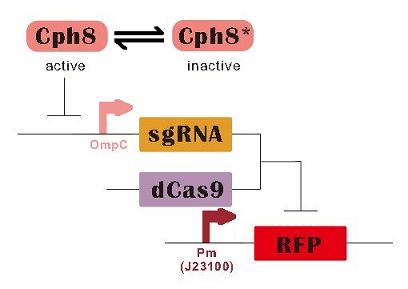Report Gene Prediction
We choose constitutive RFP as our preliminary report gene. Cph8 has been choosen as the light control system combined with dCas9 system. When we raise the red light intensity, Cph8 will inhibit the sgRNA transcription. With the decrease of the combination between sgRNA and dCas9, the expression of RFP will be up-regulated. So we expect that the red light intensity should be positive correlation with the RFP expression.
Circuit

Modeling Hypothesis
In order to figure out the typical properties of our system, the model should be visualized and controllable. For this, a number of hypotheses and approximations have been set.
- Cph8 and dCas9 are conserved as the system will be steady in most case anyway. We mainly aim at optimization instead of measuring degradation rate (Kdeg) of light sensor or the promoter strength (KP) .
- Degradation rates of normal proteins are easily got (Kdeg are easy to measured but not mentioned in most literature).
- All photoconversion processes are treated as irreversible processes.
- The expression amount of dCas9 is sufficient (the key factor which determines the inhibition ratio of report gene is sgRNA expression amount) .
PDEs
light sensor efficiency
Due to our previous hypothesis, we consider Cph8 efficiency as the ODE as follows:

Cph8 expression balance


sgRNA expression ratio

KM[Cph8]: The value of [Cph8] when the variation of [sgRNA] get its max degree.
ncph8: The Hill coefficient related to Cph8.
We can set this equation because the inhibitory ratio of sgRNA is not related to the dCas9 proteins expression amount.
RFP expression ratio due to the variation of [sgRNA]

α: The original strength of the RFP promoter Pm (J23110).
ζ: The leakage of the RFP promoter.
Results
We run our equations with basic parameters under Matlab environment and get results as follows:

The results matches our prediction: as the intensity of red light increasing, the expression level of sgRNA will be up regurgitated, and the RFP expression amount will decrease.
|